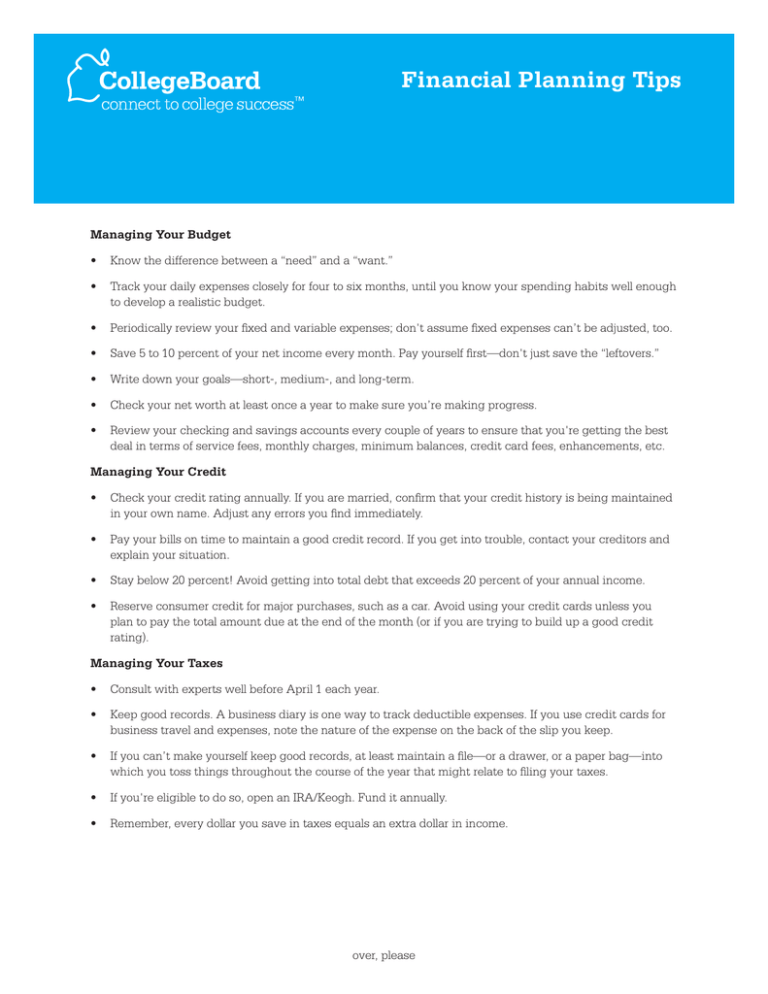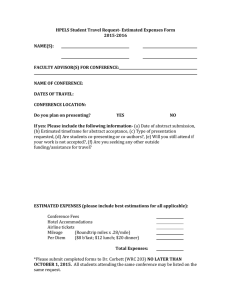
Financial Planning Tips
Managing Your Budget
• Know the difference between a “need” and a “want.”
• Track your daily expenses closely for four to six months, until you know your spending habits well enough
to develop a realistic budget.
• Periodically review your fixed and variable expenses; don't assume fixed expenses can’t be adjusted, too.
• Save 5 to 10 percent of your net income every month. Pay yourself first—don't just save the “leftovers.”
• Write down your goals—short-, medium-, and long-term.
• Check your net worth at least once a year to make sure you’re making progress.
• Review your checking and savings accounts every couple of years to ensure that you're getting the best
deal in terms of service fees, monthly charges, minimum balances, credit card fees, enhancements, etc.
Managing Your Credit
• Check your credit rating annually. If you are married, confirm that your credit history is being maintained
in your own name. Adjust any errors you find immediately.
• Pay your bills on time to maintain a good credit record. If you get into trouble, contact your creditors and
explain your situation.
• Stay below 20 percent! Avoid getting into total debt that exceeds 20 percent of your annual income.
• Reserve consumer credit for major purchases, such as a car. Avoid using your credit cards unless you
plan to pay the total amount due at the end of the month (or if you are trying to build up a good credit
rating).
Managing Your Taxes
• Consult with experts well before April 1 each year.
• Keep good records. A business diary is one way to track deductible expenses. If you use credit cards for
business travel and expenses, note the nature of the expense on the back of the slip you keep.
• If you can’t make yourself keep good records, at least maintain a file—or a drawer, or a paper bag—into
which you toss things throughout the course of the year that might relate to filing your taxes.
• If you're eligible to do so, open an IRA/Keogh. Fund it annually.
• Remember, every dollar you save in taxes equals an extra dollar in income.
over, please
Managing Your Insurance
•Make a household inventory. In the event of fire or loss, you will need it to document insurance claims.
• Protect yourself with the right insurance, but don't buy insurance you don’t need. If you have a whole life
insurance policy, review it to make sure the return on the investment portion of your premiums is competitive with other investment vehicles.
• Once a year, review the primary and secondary beneficiaries on your policies.
• Review renewal contracts of all your homeowner or renter, automobile, and other personal property
­insurance.
Managing Your Investments
• Establish an emergency fund first, before you invest. Your emergency fund should have the equivalent of
three to six months’ income.
• Work with someone you trust, and who understands your financial objectives. Interview the experts until
you find a good fit; don’t let yourself be pushed around.
• Analyze your tolerance for risk, and don't exceed it.
• Learn how to compare taxable with tax-free yields.
• Never invest in something you don’t understand.
• Be a little skeptical. If it sounds too good to be true, it almost certainly is.
• Don’t put all your eggs in one basket. Work for a balanced investment plan that permits your capital base
to grow, and that can provide income when you need it. Diversify!
• Once you’ve made investments, pay attention to them. Ask questions. Stay informed about trends. Read
books and magazines on personal and consumer finance topics. Learn from radio and television programs. Buy a pocket dictionary of financial terms, and look up every new word you hear or read.
Managing Your Retirement and Estate Planning
• Keep records in a system that others can understand and access. Should something happen to you, it will
be easier to sort out your affairs. Both partners in a marriage or long-term relationship should know where
all financial and legal records are, as well as the names of lawyers, accountants, and other advisers.
• Periodically check the balance in your social security account.
• Ask your employer’s benefits administrator to explain all your employee benefits, so you can include
information in your personal records, make maximum use of benefits when they’re needed, and decide
whether you should supplement them.
• Periodically check the amounts accruing in pension plans, supplemental annuities, etc.
• Make a will and review it periodically to ensure it continues to reflect your wishes. Couples should avoid
mutual wills.
This tipsheet may contain material related to the Federal Title IV student aid program. While the College Board believes that the information contained
herein is accurate and factual, the tipsheet has not been reviewed or approved by the U.S. Department of Education. © 2007 The College Board. All rights
reserved. College Board and the acorn logo are registered trademarks of the College Board. All other products and services may be trademarks of their
respective owners. Visit the College Board on the Web: www.collegeboard.com. Permission is hereby granted to any nonprofit school to reproduce this
tipsheet for distribution to its students, but not for sale, provided that the copyright notice of the College Board appears on all reproduced materials.




